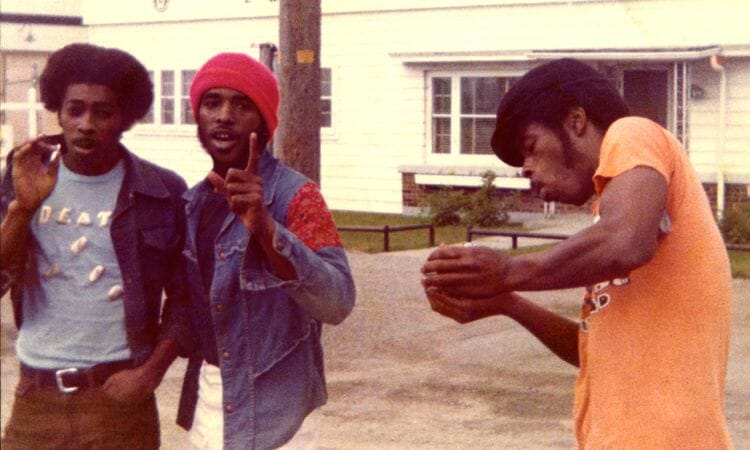By Ural Garrett · July 2, 2014


There wasn’t a sound that represented black music and its crossover marketability more than 1960's Motown. Detroit’s crowned jewel of course gave birth to The Jacksons, Marvin Gaye and Diana Ross & The Supremes among others who went on to break various racial and commercial boundaries individually. As its era highpoint ended, the label had cemented its legacy as one of pop’s biggest influences from then on. Of course, the time period also brought forth the world domination of The Beatles. Finding inspiration from both sounds would be punk rock’s best kept secret; not discovered until several decades later.
That band would simply be named Death.
The Detroit brotherly trio made up of bassist Bobby, guitarist David and drummer Dennis Hackney are heavily explored in this Mark Christopher Covino and Jeff Howlett directed rock doc A Band Called Death. Premiering two years ago during the Los Angeles Film Festival, the film gave a shocking new insight into the evolution of rock. However, A Band Called Death also plays as a study of family bonds, the music industry’s administrative reaction to artistic change and what exactly amounts to a triumph. Like any informative music biography, context is everything; something that A Band Called Death gets perfect during its 98 minute runtime. Starting with the brother’s decision to form a group to their actual discovery almost 50 years later, the film continues to add layers of captivating information at a perfect pace.
From the beginning, the film truly establishes the brothers Hackney as siblings who shared a common love for music as well as each other. There was something very touching yet heartbreaking hearing the story of de-facto leader David creating the name Death in response to their father’s untimely passing then hearing how labels executives (including industry icon Clive Davis) rejected the band as Bobby and Dennis stood by their brother in keeping the name. An easy decision at face value, A Band Called Death really reveals how the name, logo and music all were all unshakably connected but too ahead of its time. Obviously, that decision cost them dearly and while the fall wasn’t from a high place, the pain still resonated.
After moving to Vermont and even attempting to release a few gospel rock albums under a new name, Death broke up as David would move back to Detroit. Bobby and Dennis went on to form a semi successful reggae band Lambsbred. All three settled down and had a family of their own but not without facing their own individual issues. That would be until some rock vinyl collectors around 2008 would come upon some of their earlier independent recordings which were pressed in a limited run by the band as they shopped themselves around to labels. Bobby’s three sons later formed a cover band called Rough Francis after discovering the remaining master recordings in an attic decades later. Interest in Death eventually led Chicago indie-rock outlet Drag City to give a release of the bands music fascinatingly called …For The Whole World To See. Now the band travels with a new vocalist and guitarist; making fans out of rock fans and curious listeners alike.
Death’s music was punk through and through but the film is always there to always remind viewers of its dating in subtle and clever ways; giving the brother’s sonic expression and timeless feel even though it’ll be many rock fan’s first knowledge of the band. Outside of the music and incredible art direction, making A Band Called Death a human feel are the interviews from the bands living brothers Bobby and Dennis as David died of lung cancer in 2000. Complementing those hand-on accounts is fantastic commentary by Alice Cooper (another influence for the band), Henry Rollins, QuestLove of The Roots and more. Some of the best moments including Dennis recalling filling an old drum with silver eating utensils in efforts to mimic a snare drum during his childhood years or the creation of one of their first recorded songs “Politicians in My Eyes." Though race is an easy subject to hammer upon viewers' heads, A Band Called Death gracefully never relies on the fact that the band is black; the film's in-depth and precise research treats them as innovators regardless. Issues and troubles for the band in regards of success are purely creative.
As many African American artists were continually stuck in a box of where one could go musically, Death unapologetically dared to be different. It may have caused them an early defeat yet, the true triumph came later when they least expected; something that A Band Called Death always seems to remind us of at the right times.
Got Netflix? You can stream this documentary here.